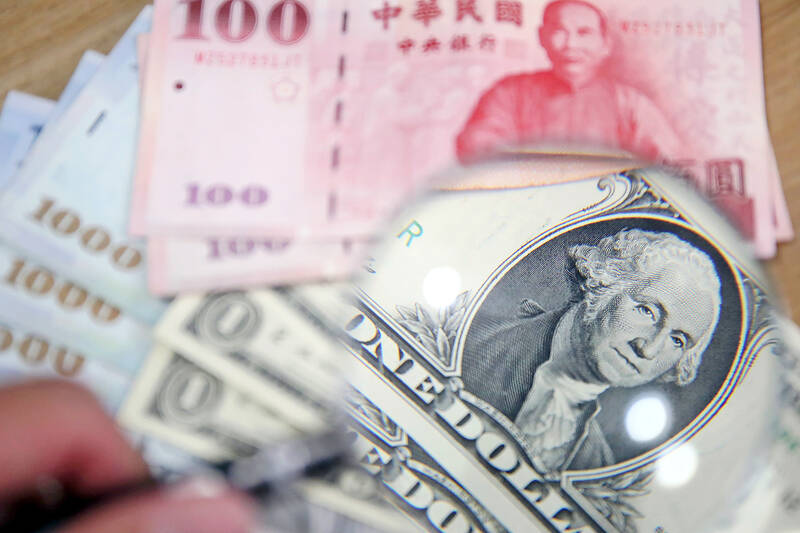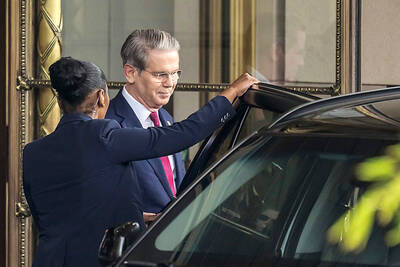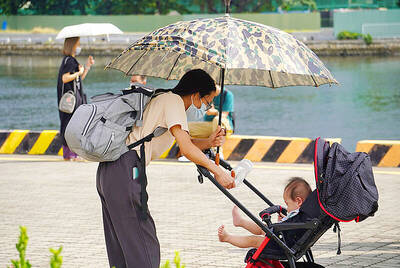The central bank yesterday eased foreign exchange controls by doubling the remittance ceilings for individuals and corporate entities to support the government’s effort to build Taiwan into a regional asset management hub.
From tomorrow, the annual cumulative remittance limit would rise to US$10 million from US$5 million for individuals and to US$100 million from US$50 million for corporate entities, Department of Foreign Exchange Director-General Eugene Tsai (蔡炯民) told a media briefing in Taipei.
“The deregulation is intended to help propel the government’s bid regarding the regional asset management hub, and reflect the nation’s growing economic strength and wealth,” Tsai said.

Photo: CNA
Taiwan’s GDP per capita was US$32,319 last year, up 55 percent from US$20,866 in 2011, while holdings in foreign securities expanded 3.48-fold to US$1.3 trillion from US$0.31 trillion over the same period, he said.
The nation’s foreign exchange reserves last year jumped 48 percent to US$570.6 billion from US$385.6 billion in 2011, adding significant resilience to the local foreign exchange market, Tsai said, adding that the central bank frowns on practices that could weaken its ability to keep the New Taiwan dollar stable.
A stable NT dollar should not be deemed a stumbling block to the development of a regional asset management center, Tsai said, adding that asset management is flourishing in Singapore without a volatile Singaporean dollar because only 10 percent of foreign exchange business involves its local currency.
In other words, people there use major foreign currencies to carry out foreign exchange transactions, leaving the Singaporean dollar largely stable, Tsai said, adding that people in Taiwan like to cite Singapore as an example to follow.
Taiwan can approach the development of the regional asset management center based on the city-state’s model, he said.
The central bank has been criticized for assigning too much importance to a stable currency and being overly conservative in its monetary policy.
Still, the central bank would keep remittance quotas because few individuals and corporations have expressed a need for looser caps, while capital flows linked to foreign trade and the asset management business have been fully liberalized, Tsai said.
Only 50 individuals and 10 companies last year demonstrated a need for relaxed remittance restrictions, and they sought approval from the central bank to address their situations, he said.
Remittances by individuals and corporate entities constituted only 5 percent of the statutory quotas, the central bank said.
Furthermore, a US government bond fund is set to hit US$900 billion next month, in line with a craze among Taiwanese for investment tools that generate fixed income, Tsai said, adding that the asset management business is thriving in Taiwan.

Taiwanese Olympic badminton men’s doubles gold medalist Wang Chi-lin (王齊麟) and his new partner, Chiu Hsiang-chieh (邱相榤), clinched the men’s doubles title at the Yonex Taipei Open yesterday, becoming the second Taiwanese team to win a title in the tournament. Ranked 19th in the world, the Taiwanese duo defeated Kang Min-hyuk and Ki Dong-ju of South Korea 21-18, 21-15 in a pulsating 43-minute final to clinch their first doubles title after teaming up last year. Wang, the men’s doubles gold medalist at the 2020 and 2024 Olympics, partnered with Chiu in August last year after the retirement of his teammate Lee Yang

FALSE DOCUMENTS? Actor William Liao said he was ‘voluntarily cooperating’ with police after a suspect was accused of helping to produce false medical certificates Police yesterday questioned at least six entertainers amid allegations of evasion of compulsory military service, with Lee Chuan (李銓), a member of boy band Choc7 (超克7), and actor Daniel Chen (陳大天) among those summoned. The New Taipei City District Prosecutors’ Office in January launched an investigation into a group that was allegedly helping men dodge compulsory military service using falsified medical documents. Actor Darren Wang (王大陸) has been accused of being one of the group’s clients. As the investigation expanded, investigators at New Taipei City’s Yonghe Precinct said that other entertainers commissioned the group to obtain false documents. The main suspect, a man surnamed

US Secretary of the Treasury Scott Bessent and US Trade Representative Jamieson Greer began talks with high-ranking Chinese officials in Switzerland yesterday aiming to de-escalate a dispute that threatens to cut off trade between the world’s two biggest economies and damage the global economy. The US delegation has begun meetings in Geneva with a Chinese delegation led by Chinese Vice Premier He Lifeng (何立峰), Xinhua News Agency said. Diplomats from both sides also confirmed that the talks have begun, but spoke anonymously and the exact location of the talks was not made public. Prospects for a major breakthrough appear dim, but there is

The number of births in Taiwan fell to an all-time monthly low last month, while the population declined for the 16th consecutive month, Ministry of the Interior data released on Friday showed. The number of newborns totaled 8,684, which is 704 births fewer than in March and the lowest monthly figure on record, the ministry said. That is equivalent to roughly one baby born every five minutes and an annual crude birthrate of 4.52 per 1,000 people, the ministry added. Meanwhile, 17,205 deaths were recorded, resulting in a natural population decrease of 8,521, the data showed. More people are also leaving Taiwan, with net